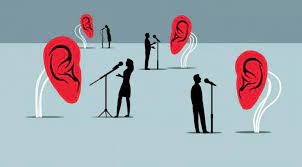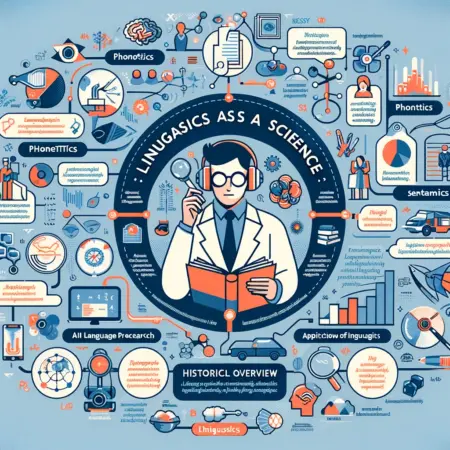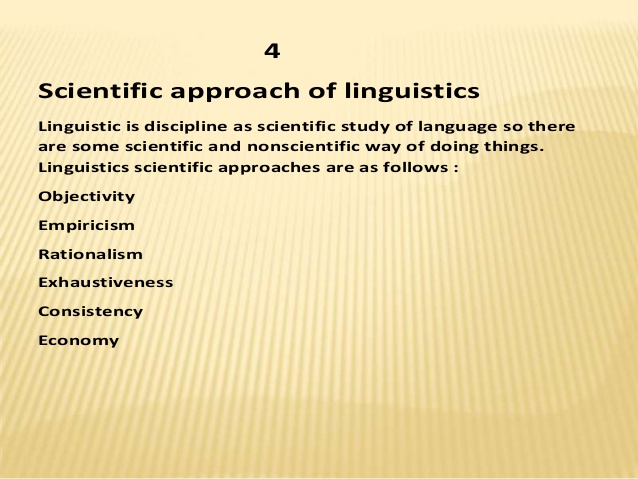Linguistics As A Science and scientific study of language. Because all other sciences linguistics has a well-defined subject matter. it employs careful methods to observe, record and analyses the various phenomena related to its subject matter and hopes to produce unprejudiced, objective and verifiable descriptions. The approach and methodology of linguistics is scientific. It is as, inductive as a science could be, and is based on observations, formation of hypothesis, testing, verification, tentativeness and productiveness.

Again like a scientist a linguist develops hypostases, makes generalized statements and tests them against the fact of languages. When a linguist or a phonetician makes a statement about languages, he makes it on the basis of observation. First he observes linguistic events. He finds some similarities and contrasts on the basis of which he makes second generalization. On the basis of these generalizations hypotheses are formulated to account for the events. These are tested by further observations, and out of them is constructed a theory of how language works. From the theory are derived methods for making statements about linguistic events.
The statements link the theory to the events it is set up to account for, and they can now be evaluated by reference both to the theory and to the events: the best statements are those which make maximum use of the theory to account most fully for the facts. And finally, like a true scientist, he is constantly engaged in discovering more about languages, in refining his methods of investigation, and in constructing better theories. He also tries to find out linguistic universals.
IT Is A Truth Universally Acknowledged That Linguistics AS A Science Subject.

Like any scientific discipline, linguistics too is not static. Viewpoints and theoretical models in the field change even in fundamental ways from time to time, and different aspects come to receive primary focus at different times. Linguistics has more than its share of unresolved controversies and unsolved questions, which is a part of fascination and challenge.
Finally its closeness with other natural sciences like mathematics, physics, physiology, biology, zoology, etc., is another proof of its scientific nature. It touches on physics through acoustics, on physiology through the structure of the human vocal organs, on zoology through the comparative study of the communicative systems of living being. A glance of any book on transformation generative grammar would convince any objective onlooker how linguistics is becoming more and more scientific.
Furthermore, as mentioned by R H. Robins, linguistics in its operations and statements is guided by three canons of science: (1) exhaustiveness, the adequate treatment of all the relevant material; (2) consistency, the absence of contradiction between different parts of the” total statement and (3)
economy, whereby, other things being equal, a shorter statement or analysis employing fewer terms is to be preferred to one that is longer or more involved. Consequently, linguistics is getting more and more technical and sophisticated every day. Yet it is not a pure science. Its position, says R.A. Hall, is between the natural and social sciences, like that of geology. To Robins it is an empirical science,’ and within the empirical sciences it is one of the social sciences, because its subject matter is human and is very much different from that of natural sciences.
Linguistics as an empirical science; Linguistics As A Science.

Sciences such as psychology, sociology, anthropology, and so on, are often called “empirical” sciences. That is, the sciences are based on “facts” and “data” that can be tested by certain experts as well as by all other experts. The same is true of linguistics. In empirical science researchers distance themselves from “beliefs” that are not based on facts. According to Kant (in Fauzan, 2014: 27) empiricism provides synthetic decisions, the truth of which is not absolute.
Each science has a scope of knowledge and a number of scientific tasks. Let us define the various tasks of linguistics as a science.
1. Study the origins of language and its essence.
2. Pay attention to the structure of the language.
3. To study language as an integral system, all the members of which are interconnected and interdependent, and not isolated facts, not a collection of words.
4. Consider the development of language in relation to the development of society (the process of the emergence of both)
5. Studying the problems of the emergence and development of writing.
6. Classifying languages, namely combining them according to the principle of similarity; how closely related languages German and English stand out; Russia, Ukraine and Belarus.
7. Develop learning methods. There are methods such as comparative -historical, descriptive, comparative, quantitative (quantitative, based on mathematical statistics).
8. Linguistics seeks to be closer to life, because of its applied nature.
9. Studying problems related to language interference, namely the influence of knowledge of the mother tongue or one of the foreign languages studied on the knowledge gained in learning a new foreign language.
10. Consider the relationship of linguistics with other sciences (literary criticism, history, logic, psychology, mathematics).
Linguistics As A Science
Linguistics is the scientific study of language and its structure. Like other sciences, it involves forming hypotheses, conducting experiments, making observations, and drawing conclusions based on evidence. Linguistics encompasses a wide range of topics, from the sounds of speech to the meaning of sentences, and it approaches these topics in various ways, employing methodologies from the humanities, social sciences, and natural sciences. Here’s an overview of linguistics as a science:
- Areas of Study: Linguistics is divided into several subfields, each with its own specific focus:
- Phonetics: The study of the physical sounds of human speech.
- Phonology: The study of the way sounds function within a particular language or languages.
- Morphology: The study of the internal structure of words.
- Syntax: The study of how words combine to form sentences.
- Semantics: The study of meaning.
- Pragmatics: The study of how context influences the way language is interpreted.
- Sociolinguistics: The study of how language varies and changes in social groups.
- Psycholinguistics: The study of how language is processed in the brain.
- Empirical Approach: Linguists collect data, often in the form of recorded speech or written texts, and then analyze this data to form and test hypotheses about how language works. This is similar to the methods used in other sciences.
- Formal Models and Theories: Linguists often develop formal models to explain patterns they observe in languages. For instance, in the field of syntax, tree diagrams might be used to represent the structure of sentences.
- Experiments: In areas like psycholinguistics, experiments are designed to understand how language is processed in real-time by the brain.
- Descriptive vs. Prescriptive: Linguistics, as a science, is descriptive, meaning it aims to describe and understand language as it is, rather than prescribing how it should be. This contrasts with more prescriptive fields like grammar teaching, which often have norms and rules about “correct” language use.
- Universality and Diversity: One major goal of linguistic research is to find out what features all human languages share and how they differ. This helps in understanding the inherent nature of human language.
- Interdisciplinary Nature: Linguistics intersects with many other fields, including anthropology, cognitive science, neuroscience, computer science (especially in natural language processing), and more. This gives it a broad scientific base.
- Evolution of Language: Linguists also study the history and evolution of languages, trying to reconstruct ancient languages and understand how and why languages change over time.
Linguistics, the scientific study of language, can be explored through various aspects. Here’s a guide in a tabular format to help you understand the key components:
1. Branches of Linguistics
| Branch | Description |
|---|---|
| Phonetics | Study of speech sounds |
| Phonology | Organization of sounds in languages |
| Morphology | Study of word formation |
| Syntax | Structure of sentences |
| Semantics | Meaning of words and sentences |
| Pragmatics | Use of language in context |
2. Language Levels
| Level | Focus |
|---|---|
| Sound | Phonetics and Phonology |
| Word | Morphology |
| Sentence | Syntax |
| Meaning | Semantics and Pragmatics |
3. Research Methods
| Method | Purpose |
|---|---|
| Fieldwork | Data collection from native speakers |
| Experimental | Testing hypotheses under controlled conditions |
| Corpus Linguistics | Analyzing large text databases |
| Computational Linguistics | Language modeling using computer algorithms |
4. Applied Linguistics
| Application | Description |
|---|---|
| Language Education | Teaching and learning languages |
| Translation Studies | Theory and practice of translation |
| Forensic Linguistics | Language analysis in legal contexts |
| Sociolinguistics | Language’s relation to social factors |
5. Theoretical vs. Applied Linguistics
| Aspect | Theoretical Linguistics | Applied Linguistics |
|---|---|---|
| Focus | Language structure & theory | Practical language issues |
| Examples | Phonology, Syntax | Language teaching, Translation |
6. Linguistic Universals
| Concept | Description |
|---|---|
| Universal Grammar | Innate structure common to all languages |
| Typology | Classification of languages based on similarities |
7. Linguistic Change
| Type | Description |
|---|---|
| Sound Change | Evolution of pronunciation |
| Grammatical Change | Shifts in syntax and morphology |
| Semantic Change | Changes in word meanings |
This table provides a foundational overview of linguistics as a science, highlighting its diverse branches, levels of language analysis, methods of research, applications, and key theoretical concepts.
